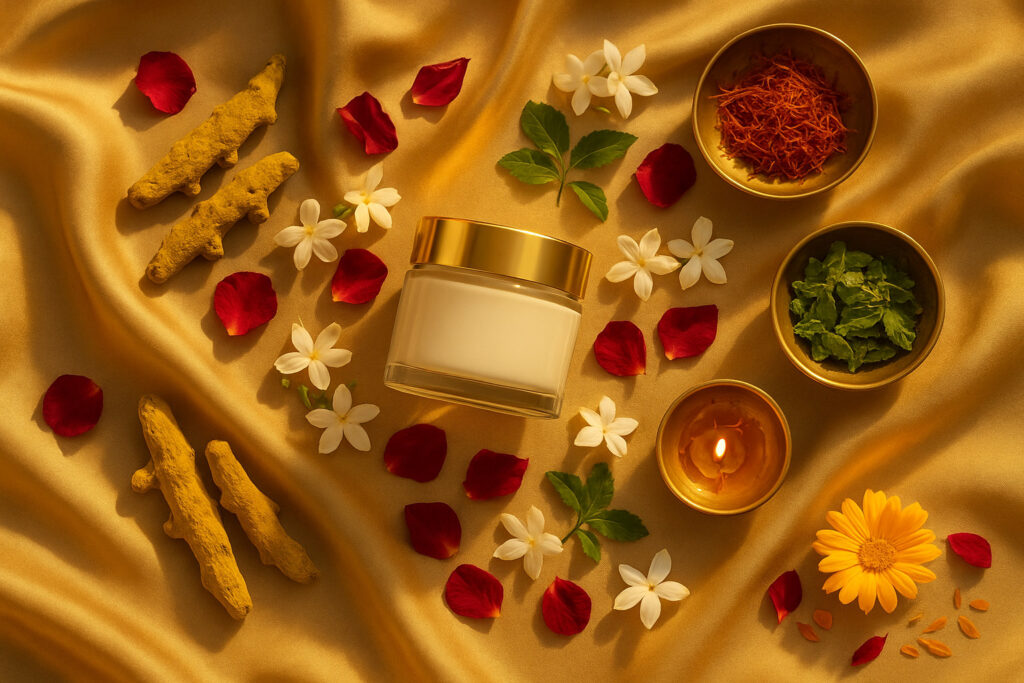Understanding how hormonal changes affect your skin after menopause is crucial, as it’s more than just a cosmetic issue—it’s a deep biological shift. As estrogen levels dip, many women notice dry, sagging, or thinning skin. But don’t worry—you’re not alone, and your glow isn’t gone forever. With the right support and rituals rooted in Ayurvedic wisdom, your skin can thrive beautifully, even after menopause. Download my free 30-day Ayurvedic Skincare Planner to build a glowing routine that supports your post-menopause skin.
Aging gracefully isn’t just about embracing silver strands or celebrating laugh lines—it’s also about understanding what’s happening beneath the surface. If you’re post-menopausal or nearing that phase, you may have noticed some surprising hormonal skin changes : dryness, sagging, sudden breakouts, or even unexplained redness. The culprit? Hormones.
Let’s explore the specific ways menopause impacts your skin—and more importantly, what you can do to glow through it all.
What Happens to Hormones After Menopause?
Menopause marks the end of menstruation and brings a dramatic drop in the production of key hormones—primarily estrogen and progesterone. These hormones do more than regulate your cycle. They also play a crucial role in maintaining the skin’s:
- Elasticity
- Hydration
- Thickness
- Wound healing
- Collagen production
When estrogen takes a nosedive, your skin notices almost immediately. Think of it like a garden suddenly cut off from water—it starts to wither, crack, and lose its vibrant bloom.
How Your Skin Reacts to This Hormonal Shift
1. Loss of Elasticity and Sagging
Estrogen supports collagen and elastin—the proteins responsible for firm, youthful skin. With their decline, the skin loses its bounce and begins to sag, especially around the jawline and cheeks.
2. Dryness and Itchiness
Reduced estrogen means less oil (sebum) production. The result? Dry, flaky, or itchy skin that might make you feel like you’re wearing a size-too-small bodysuit made of sandpaper.
3. Thinning and Bruising
Your skin becomes thinner and more fragile post-menopause. This means minor scrapes leave lasting marks, and bruises may show up after the lightest bump.
4. Breakouts and Acne
Thought pimples were just a teenage problem? Think again. Hormonal skin changes after menopause can stir up those unwelcome guests—especially around your chin, jawline, and neck. Shifting estrogen and androgen levels throw oil production off balance, which can clog pores and lead to adult breakouts.
Don’t worry—it’s not your fault. Your skin’s just trying to rebalance itself.
5. Increased Sensitivity and Redness
As your skin’s natural barrier weakens, you may develop rosacea-like symptoms, increased sensitivity, or even allergic reactions to products you’ve used for years.
What Ayurveda Says About Hormonal Skin Changes
In Ayurveda, how hormonal changes affect your skin after menopause is seen through the lens of a natural Vata imbalance—marked by dryness, irregularity, and movement. Vata tends to increase after the age of 50, bringing symptoms like dry skin, insomnia, and anxiety. An Ayurvedic skincare approach focuses on grounding, nourishing, and stabilizing the body from within.
From Ayurveda, we learned the value of:
- Oiling rituals (Abhyanga) using sesame or almond oil
- Herbs like Shatavari and Ashwagandha to balance hormones
- Hydrating foods like ghee, warm soups, and soaked almonds
- Daily routines (Dinacharya) to regulate Vata and improve skin health
Lifestyle & Skincare Tips for Post-Menopausal Glow
Now that we understand how hormonal changes affect your skin after menopause, let’s turn that knowledge into action—with simple ways to support your skin from the inside out.
🌿 Hydrate From Within and Without
- Drink warm water with lemon and soak chia or flax seeds for internal hydration.
- Use humectant-rich moisturizers with hyaluronic acid or natural alternatives like aloe vera.
🧘♀️ Manage Stress (Your Skin Feels It Too!)
- Hormonal changes can be emotionally turbulent. Practice yoga, breathwork (pranayama), or meditation to soothe your nervous system.
🍵 Eat Skin-Loving Foods
- Favor healthy fats: ghee, avocados, nuts, seeds
- Add cooling herbs like fennel, coriander, and cardamom to balance excess heat and inflammation
🌺 Switch to Gentle, Ayurvedic Skincare
- Ditch foaming cleansers. Opt for milk, honey, or besan (chickpea flour) instead.
- Use rosewater or aloe as toner.
- Apply a few drops of Kumkumadi oil at night to boost radiance.
Need help figuring out your skin’s needs? Take the Discover Your Dosha Skin Quiz to personalize your post-menopause routine.
💤 Prioritize Sleep
- Skin renews itself at night. Go to bed by 10 PM and keep electronics away to help melatonin (your skin’s repair hormone) do its job.
When to Talk to a Professional
If dryness, itchiness, or rashes don’t improve in a few days:
Ask your doctor about menopausal hormone therapy (MHT/HRT) if skin issues are severe — it may restore skin thickness & hydration. Read more
Seek dermatology help if suspecting lichen planus, eczema, shingles, or rosacea healthline.com
Before you scroll through these tips, it’s worth remembering that the relationship between hormones and post-menopausal skin is complex—but manageable with the right guidance.
Quick Takeaways
| Challenge | Why It Happens | Smart Action |
|---|---|---|
| Dryness, itch | ↓ Estrogen → less sebum & collagen | Moisturize, avoid hot showers |
| Wrinkles & sag | Collagen fades fast | Use peptides, retinoids, SPF |
| Acne & rosacea | Hormonal imbalance, heat triggers | Gentle cleansers, avoid triggers |
| Itching | Skin barrier weak | Oatmeal baths, ceramide creams |
By understanding how hormonal changes affect your skin after menopause, and combining gentle Ayurvedic rituals with dermatologist-approved products, you can reclaim moisturized, radiant skin. — even in your post‑menopause years.
Want a step-by-step routine tailored for mature skin? Start here with your free Ayurvedic planner.
Final Thoughts: You’re Not Alone in This
Menopause doesn’t have to mean defeat—it’s a transition, not a decline. With the right care, and a deeper understanding of how hormonal changes affect your skin after menopause, you can absolutely thrive. Your skin reflects your inner balance. If your hormones are having a party, Ayurveda is here to bring the playlist, the food, and the soothing vibes.
So breathe, sip that herbal tea, and apply your favorite glow oil. Your radiance isn’t lost—it’s simply evolving.
Frequently Asked Questions About How Hormonal Changes Affect Your Skin After Menopause
1. What happens to your skin after menopause?
How hormonal changes affect your skin after menopause depends on shifts in estrogen and progesterone, which can lead to dryness, thinning, and sagging. Skin may appear thinner and more sensitive as collagen production slows.
2. How can I improve my skin naturally after menopause?
Ayurvedic skincare rituals like daily facial massage, hydrating oils, and dosha-based routines help restore radiance. Herbs like Ashwagandha and Kumkumadi oil are especially beneficial.
3. Is it normal to have sudden skin changes after menopause?
Yes, it’s completely normal. As hormone levels shift, the skin’s ability to retain moisture decreases, making dryness and fine lines more noticeable. A consistent routine helps manage these changes.
4. What Ayurvedic remedies work best for post-menopausal skin?
Look for natural oils like Kumkumadi, saffron, or almond oil. They nourish the skin and boost glow. Eating warm, nourishing foods and reducing stress also support skin balance.
Still unsure what your skin needs? Take the quiz and let Ayurveda guide you back to radiance.




